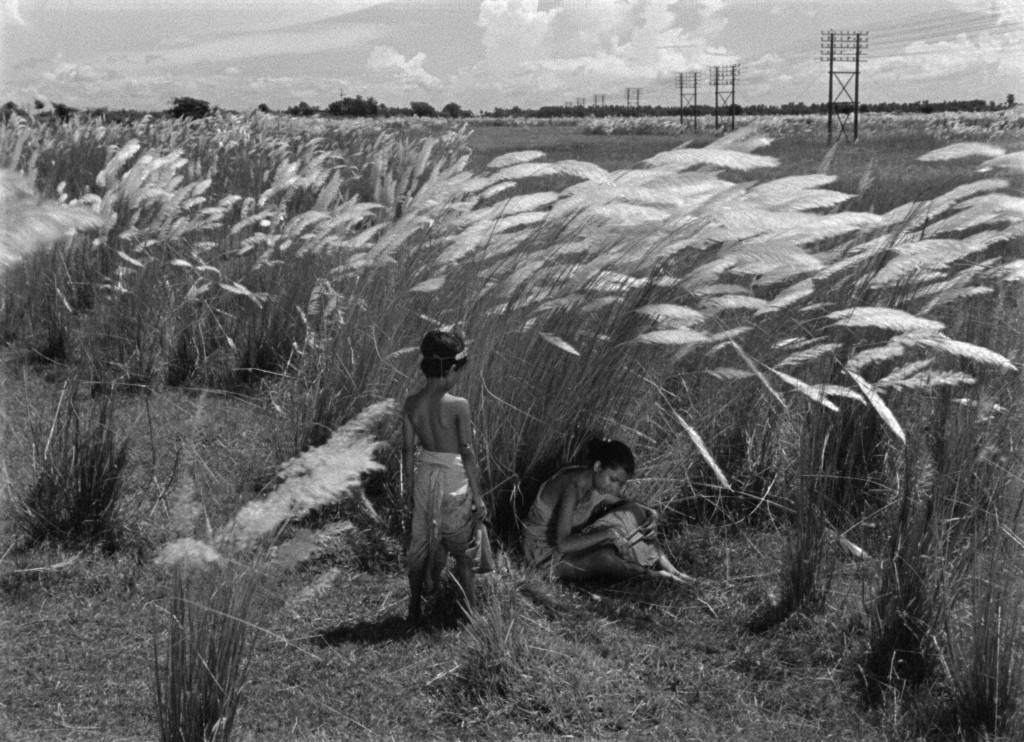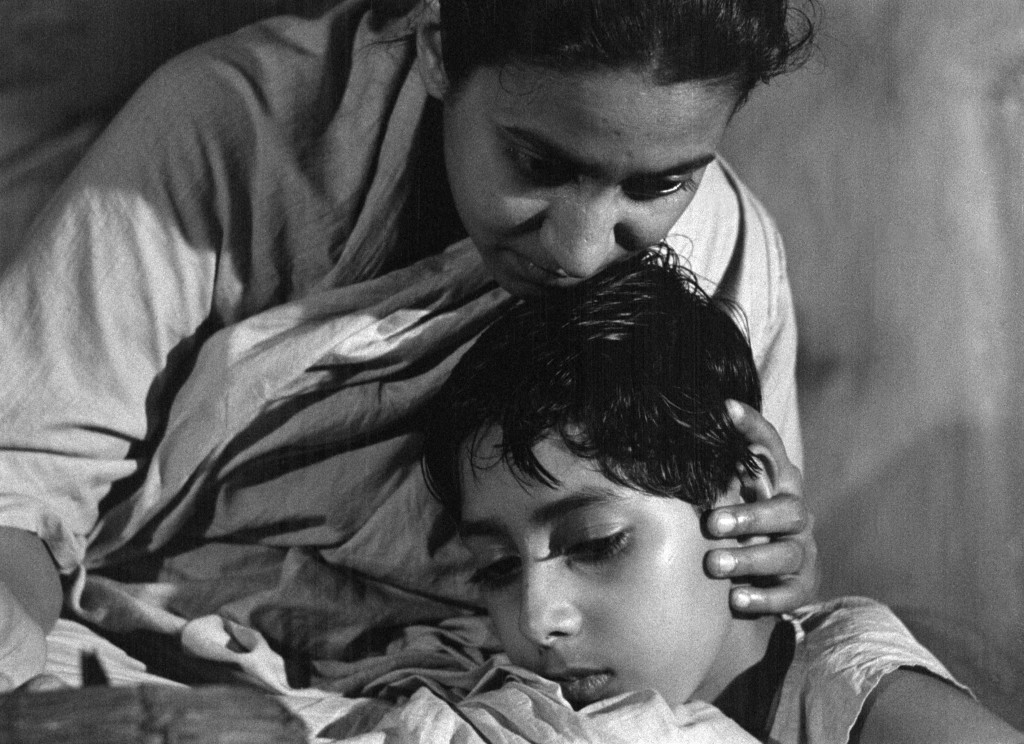Everything I’m going to write here pales in comparison to Roger Ebert’s great insight in that clip above. He calls movies “a machine that generates empathy.” That’s an idea that’s stuck with me for a long time and through many movies. It might not be the first thing that leaps to mind when I consider something like Mad Max, but it’s always there. No matter how poorly crafted or cynically conceived, every movie has the capacity to connect us with the experiences of others. Most of the time that’s engaged simply to get us cheering for the protagonist and jeering at the antagonist, but our capacity for empathy can go far beyond that. It can make us stare without blinking at our own awful past. It can make us consider the furthest stretches of our capacity for love and connection. Or it can make us sit down, eat some popcorn, and see a way of life that is both utterly foreign and thoroughly recognizable. That’s exactly what I did last week when I took in the sterling 4K restoration Satyajit Ray’s Apu Trilogy at The Music Box Theatre.
I wrote the above paragraph on the night of Tuesday, June 16th. The next night a white supremacist terrorist took nine innocent lives in Charleston, South Carolina because he hated them for their skin color. That attack has shaken me up and brought about a significant rewrite to the rest of this piece.
Re-reading my sentiments in that opening paragraph filled me with immense sadness when I re-opened this tab. All I could think of was the empty and terrifying void where empathy should have been in the mind of that young terrorist (I’m not going to give that man the satisfaction of naming him) who took nine lives. I cannot fathom how his mind could be so devoured by hatred that he saw his victims, and seemingly all African-Americans, as lacking the emotional and intellectual complexity and validity of a human being. He saw them as “less than” or as “other” and marked them as a threat to his (sad) way of life. I don’t want to focus on him, especially when it will do the world far more good to remember the lives he took. I apologize if this all feels as rant-y and off-topic as my Facebook wall tends to be. But spending some time considering the lives of others is actually at the very center of The Apu Trilogy.
The films focus on the life of a young boy who grows up in dire poverty in Bengal during the early part of the 20th Century. The first film, Pather Panchali (Song of the Little Road), is about the formative years of Apu’s life, spent in the family’s ancestral home with little money and mere dreams of the outside world. It centers mostly on the three women who dominate Apu life. his mother, great-aunt, and sister. Two of them die before the film ends, so…be prepared to feel emotionally battered if you see this. The second, Aparajito (The Unvanquished), is about the family’s move to Benares in an attempt to find more success and Apu’s eventual education and move to Calcutta to enroll in college. The film again features multiple deaths in the family, but even more excruciating, is the emotional distance that grows between Apu and his mother as he grows into being his own person. The final film, Apur Sansar (The World of Apu), is about Apu’s unexpected (and often hilarious) marriage and the final emotional ringer he must go through in order to become a good father to his son.
In lesser hands, these movies could feel like a parody of self-serious world cinema. Their focus on the degradation of poverty, personal loss, and lack of propulsive plot lines are just asking for someone to brandish the term “misery porn” and dismiss the entire trilogy out of hand. But Ray triumphs over that in two ways. The first is his ability to draw the lyrical and poetic out of his characters’ experiences. The most famous example of this is in Pather Panchali, when Apu and his sister, Durga, wander further from home than they ever have before and see a train chug across the verdant fields of the Ganges Delta. It would be a mundane moment in my life, but is full of wonder and awe for these two poor kids from the Bengali backroads.
The second, and why I tied this to the awful events in Charleston, is that Ray is one of those rare directors whose sense of humanism is so strong that he gives every character a sense of individuality and personal experience that defies the snap characterizations of Hollywood cinema. My favorite example of this is the treatment of Apu’s mother, Sarbajaya, who must bear the brunt of her family’s struggles throughout the first two films. She is a good mother who cares deeply for her children and loves her husband. But the stress of making ends meet and disciplining the kids during her husband’s long absences trying to find a job can overwhelm her. She clashes with the wizened “Auntie,” who lives with them for eating their food without contributing in kind, and is hard on Gupta for not being a greater help, even though her daughter is still a child.
It would be easy for a film to treat Sarbajaya as uncaring or shrewish. Instead, Ray makes us understand her as a complex person with competing impulses and a deeply stressful life. Her struggles to keep the family afloat reminded me of all the planning and work that my own wife Becky does to keep our family and home chugging along. Now, Becky and I live a life of much greater prosperity and ease than is seen in the film, but I could still see the paralells between the sacrifices she makes and those of Sarbajaya in the films. What’s more, I could not help but feel some guilt at seeing how unburdened the father, Harihar, was by his family’s sacrifices and suffering. Even more, when Apu leaves his mother behind to go pursue a degree in Calcutta it made me think of what a dick I must have been to my own parents as I grew up and rebelled from their caring authority. In short, the characterization and humanism of one character in these films made me reflect on my own actions what I take for granted every day and vow to do a little bit better.
Which brings us all the way back to empathy. Satyajit Ray made these movies 60 years ago, but this new restoration is giving them a new life and a larger audience. These films implicitly ask their audience to see the characters on screen as real people. Real people who deserve your respect and understanding and empathy. Humans are social creatures, we require contact with others to sustain our own selves. But maintaining those contacts, and turning them into the lasting bonds of affection and community that define our species, requires us to think outside of our own minds and consider how others think and feel. That’s what the terrorist in South Carolina lacked, or perhaps, what he refused. He would not see other people as real and worthy of consideration. The Apu Trilogy is a landmark of world cinema because it broadens our horizons and deepens our understanding of ourselves and others. In the wake of that barbarous act of terrorism, I can’t think of a more worthwhile endeavor than trying to understand my fellow humans a little bit better.





